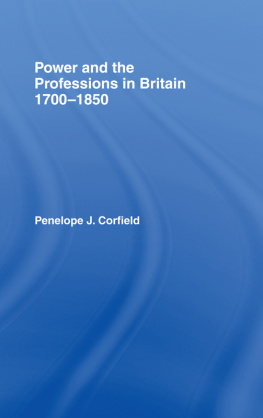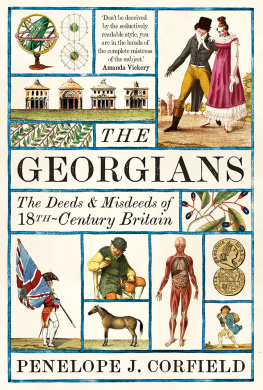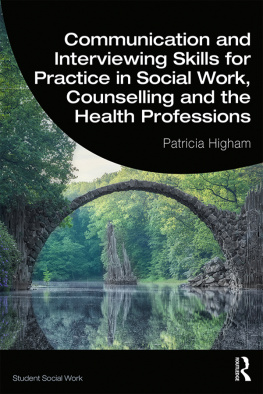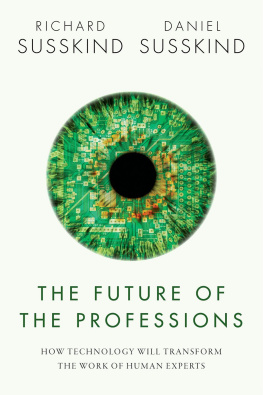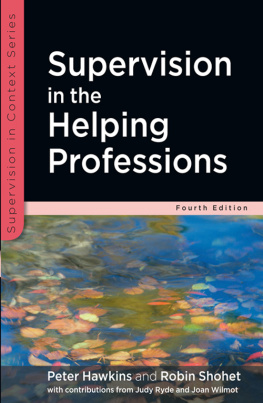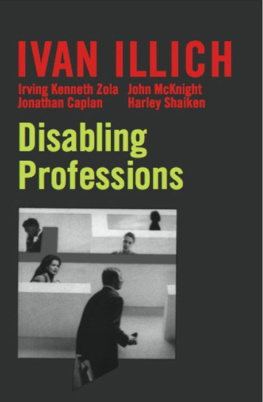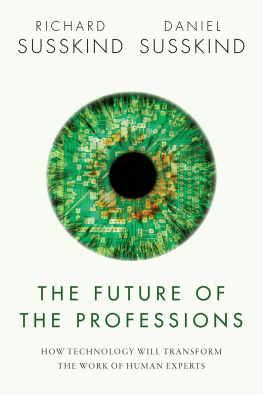First published 1995
by Routledge
11 New Fetter Lane, London EC4P 4EE
Simultaneously published in the USA and Canada
by Routledge
29 West 35th Street, New York, NY 10001
First published in paperback 2000
Routledge is an imprint of the Taylor & Francis Group
This edition published in the Taylor & Francis e-Library, 2001.
1995 Penelope J. Corfield
All rights reserved. No part of this book may be reprinted or reproduced or utilised in any form or by any electronic, mechanical, or other means, now known or hereafter invented, including photocopying and recording, or in any information storage or retrieval system, without permission in writing from the publishers.
British Library Cataloguing in Publication Data
A catalogue record for this book is available from the British Library
Library of Congress Cataloguing in Publication Data
Corfield, P. J.
Power and the professions in Britain, 17001850 / Penelope J. Corfield.
p. cm.
Includes bibliographical references and index.
1. ProfessionsSocial aspectsGreat BritainHistory18th century. 2. ProfessionsSocial aspectsGreat BritainHistory19th century. 3. Power (Social sciences)
I. Title.
[HT690.G7C67 1999]
305.5'53'0941dc21 9933041
ISBN 0-415-22265-6 (Print Edition)
ISBN 0-203-01885-0 Master e-book
ISBN ISBN 0-203-17344-9 (Glassbook Format)
Preface
If goodwill alone were enough, it would be relatively easy, though not totally plain sailing, to write books. But the process requires a large amount of undivided time and concentration that is difficult to find, in this age of intensive teaching and burgeoning academic administration. As a result, two periods of study leave, which were devoted to the development of the arguments presented here, have proved invaluable. The Institute for Advanced Study in Princeton provided stimulating company and time for cogitation in the Autumn Semester 1987; and thanks go especially to Inga Clendinnen, Lawrence Duggan, John Elliott, Josep Fradera, Charles McClelland, James Van Horn Melton, Peter Paret, Maurice Slavin and Lawrence Stone for many good discussions. In addition, the British Nuffield Foundation generously awarded a Social Science Fellowship, tenable in London, for the academic year 198990. That conferred a true lifeline, without which the whole project would have stalled.
There are other practical and intellectual debts that it is also a pleasure to acknowledge. Colleagues in the History Department at Royal Holloway furnish a supportive and stimulating work environment; and students kindly humour my prediliction for debating the definition of historical terms. In addition, many friends have provided references and arguments, including Peter Clark, Joy Dixon, Eric Evans, Tony Henderson, Tim Hitchcock, Geoffrey Holmes, Julian Hoppit, Ludmilla Jordanova, Serena Kelly, Charles Medawar, Simon Renton, John Styles, John Turner, Amanda Vickery and Tim Wales. In addition, Arthur Burns, Margaret Pelling and David Sugarman have criticised individual chapters; and Simon Renton provided advice on eighteenth-century legislative procedures.
Research seminars at Lancaster and Stockholm Universities have also responded to early versions of this material with stimulating discussions. In practical terms, the Leverhulme Trust generously awarded funding to facilitate the computerisation of data relating to the professions and Tim Hitchcock supplied timely technical aid. Similarly, the research fund of Royal Holloway helped to initiate the creation of an Attornies database, with the expert assistance of Matthew Woollard. Throughout, the Royal Holloway Computer Centre has been a mainstay of support, with thanks especially to Phil Taylor and to Cathy Harbor, and to Claire Steward at the University of London Computer Centre for help with the optical character reader.
In addition, a host of specialist libraries and institutions many of them generated by the professions in their prime have kindly answered queries and made resources available. Special mention should be made of John Symons of the Wellcome Institute Library for his knowledgeable advice and friendly interest. And the hard-worked staff at the British Library get my heartfelt thanks for delivering thousands of books and answering queries with good humour and patience.
Illustrations have been made available from the following sources, whose assistance is acknowledged with thanks: the British Library; the British Museum (Department of Prints and Drawings); the Harry Price Library, Senate House, University of London; Princeton Universitys Firestone Library (Prints Department); the Law Society; and the Wellcome Institute Library (London).
Making a case study of power, this study sets out to analyse the textual, statistical, and visual material that relates to the public face and social prestige of the professions in Britain between 1700 and 1850. As part of that, it also considers the varieties of consumer response, which characteristically ran the gamut from sincere admiration to deep suspicion. George Bernard Shaw was not the first to fear that the friendly mask of the specialist services concealed a large amount of occupational self-interest. His 1906 dictum that the professions are all conspiracies against the laity was a vigorous warning to the public not to be too gullible. That concern had a long history behind it. As a result, the contested power of the professions has attracted much probing research and analysis, which is being produced at an ever increasing rate. The discussion here acknowledges inspiration from the fertility and scope of these continuing debates.
Lastly, three special debts of gratitude call for special record: with thanks to Jack Fisher, the meta-critic who first suggested this topic for enquiry; to Barry Supple and Michael Thompson, who have given staunch backing and encouragement to the project throughout its gestation; and, indubitably, to Tony Belton.
Penelope J. Corfield
London: 1994
Acknowledgement
Grateful acknowledgement is made to the Isabel Thornley Bequest, University of London, for a grant towards the cost of publication.
1
Power
Nam et ipsa scientia potestas est knowledge itself is power.
(Francis Bacon, 1598)
Power is protean and takes many forms. It is forceful, renewable and divisible although in practice not infinitely so. It is also notoriously difficult to apportion or quantify. There are often many different sources of power within any given community; and outer manifestations do not always coincide with real command. Contests may produce immediate winners and losers. But even then, if success has been brought at too high a price, the long-term impact may differ from the short-term result. Furthermore, in an expanding universe, there is no fixed cake or restricted quota of power. As a result, it cannot be tallied by strict rules of accounting. An increase in power for one person or group does not automatically mean that all others lose by an absolutely equal amount, although that does not prevent established power-brokers from generally fearing such an outcome. Equally, however, authority can decline as well as rise. Some power above all, monopoly power is genuinely diminished by the advent of successful rivals.

